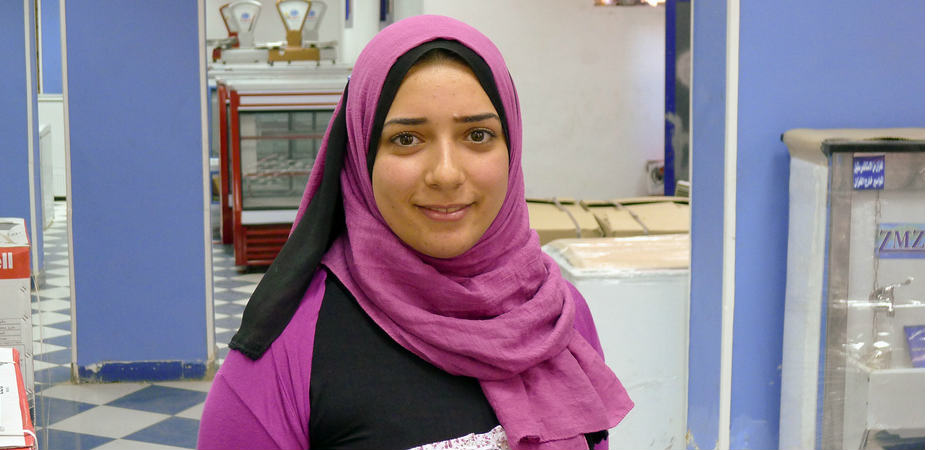Promoting female entrepreneurship in developing countries is crucial in the fight against poverty.
After a discussion with Christopher M. Schroeder, it was clear that female entrepreneurship is thriving across the Middle East and North Africa, particularly in the technology sector. In his new book, Startup Rising: The Entrepreneurial Revolution Remaking the Middle East, Schroeder reports that over a third of startups in the region are run by women — a higher percentage than in Silicon Valley. For years, women in North Africa have strived for economic and social empowerment. Yet while important progress has been made, women in the region still suffer at the hands of the rest of society.
Jobs and Development
Considered a youth phenomenon, unemployment in the Middle East and North Africa is a significant challenge, and remains a barrier to the latter’s development. With the world’s highest youth unemployment rate, this does not only require the state, private sector, and nonprofit and nongovernmental organizations to take action. It mostly requires the youth themselves to take part in the current entrepreneurial market across the globe. As they are all responsible for generating employment, with an innovative approach, they would all have the ability to tackle this problem in an effort to spur job creation and boost economic development.
A significant barrier to employment in North Africa is the lack of resources and cultural and social barriers. This manifests itself among women who might be discouraged to go into technology, entrepreneurs who might not have access to an international network, and skillful graduates who might not be able to land their dream job or might be unsatisfied with their salaries. This author argues that technology can be a key way to improve the situation for women — especially young women.
Today, with half of the population in the Middle East and North Africa under the age of 25 — both male and female — creating access and opportunity for women interested in obtaining software development skills and information about the latest technology trends should become a priority. High rates of unemployment and underemployment among young people are often cited as reasons for migration and brain drain.
While many remain skeptical about the benefits of the technology industry, its impact is much deeper and brings employment and higher paying jobs. Using software for educating and building literacy in different sectors, and training young women in information technology skills after graduating from school can enhance their chances of employment and will effectively bring positive results. For example, Morocco, Tunisia and Egypt are very youthful nations, which underscores the importance of building capabilities, skills and assets that these countries need to compete in an increasingly globalized world and to generate employment.
If technology was available to girls in remote regions from an early age, some of them would see it as an opportunity and use it to educate and empower themselves. As any North African country collectively strives for economic growth and seeks an end to poverty, there needs to be an effort to provide enhanced incentives for women who graduate with majors related to technology, math, engineering, science and business management to create their own innovative companies, and be at the forefront of economic progress rather than be cross-examined and ultimately discouraged by their surroundings.
Based on personal experience and research, this author believes that with a strong source of knowledge, a large network and a platform to have a voice within the technology community, women can make an impact in the world, provide a better life for themselves and their families, and become leaders in the field.
Challenges in Education
One of the main challenges the education sector faces in North Africa is a lack of access to technology. In fact, there is a lack of Internet and computer access, minimal support in rural areas, and cultural impediments discouraging young women who might otherwise be motivated to graduate with majors related to science, technology, engineering and mathematics (STEM).
This undoubtedly presents women with a certain set of challenges and obstacles to overcome. In order to fully comprehend possible ways to address these challenges, it is pivotal to examine civil society initiatives that are working to promote technological entrepreneurship, reverse this lack of market access for women, and increase overall employment in North Africa.
After a discussion with Christopher M. Schroeder, it was clear that female entrepreneurship is thriving across the Middle East and North Africa, particularly in the technology sector. In his new book, Startup Rising: The Entrepreneurial Revolution Remaking the Middle East, Schroeder reports that over a third of startups in the region are run by women — a higher percentage than in Silicon Valley.
Examining the efforts of civil society initiatives such as TechWadi, one can understand the tremendous progress that is being made to mentor high-impact and highly accomplished entrepreneurs in different regions of the Middle East and North Africa. This organization brings together technology experts through a number of conferences, networking events, workshops and mentorship programs. Ossama Hassanein succeeded in building a large network of technology leaders, who are committed to supporting entrepreneurship in the Middle East. While he spends most of his time commuting between Canada, Europe, Middle East and Silicon Valley to work with talents, promising startups are accepted into their programs throughout the year. One hundred experts, including mentors and investors, provide ongoing mentorship to help youth with every aspect of their companies to enable success, and build a sustainable infrastructure to help entrepreneurship thrive.
Another civil society initiative working toward fostering youth employment is Education for Employment, a nonprofit and nongovernmental organization. It provides economic opportunities to unemployed youth in North Africa through entrepreneurship training and placement programs. Since its creation in 2006, the organization has trained and found employment for over 3,300 youth across the region.
Yet another international organization working tirelessly for women in technology is Girls in Tech, which aims to improve and empower influential women in tech and entrepreneurship by teaching them to pursue their full social, economic and civic potential. Thus, such an initiative enables women to manage their own socioeconomic progress through education and economic empowerment. The work of Girls in Tech and its counterparts is making remarkable progress in informing women in urban and rural communities around the world about the possibilities that are available to them, if they attain an education in the STEM field and make their voices heard in the technology space. The advantages that such initiatives have specifically for youth employment strategies and wider economic benefits in North Africa are powerful.
This kind of program can play a key role in transmitting information and encouraging dialogue as a means of educating women about their important roles in society. NGO projects such as those undertaken by Girls in Tech not only offer women a basic education, but also focus on enhancing knowledge of their human and legal rights, as well encouraging self-empowerment in order to create a deeper self-awareness and respect.
Today, with half of the population in the Middle East and North Africa under the age of 25 — both male and female — creating access and opportunity for women interested in obtaining software development skills and information about the latest technology trends should become a priority. High rates of unemployment and underemployment among young people are often cited as reasons for migration and brain drain.
Women are, therefore, able to become self-sufficient as opposed to being oppressed by the ignorance that limits their social, economic and physical mobility. A change in the mentality of women in rural areas is vital to bringing about faster and more widespread results. If the women in question do not believe they have the right and potential to pursue education or other endeavors, then regional and national efforts will be futile.
Empowerment of Women
While demands for modernization have increased, there has not been a corresponding rise in programs that strengthen women’s movement in technology and entrepreneurship. Due to the persistence of patriarchy and gender inequality, the role of entrepreneurship in promoting women’s empowerment and development has not yet taken root. Therefore, there remains a need for additional incentives and projects to encourage social dialogue and engagement of drivers of change for women in technology. A new policy on gender-based entrepreneurship and greater coordination between the governmental and local actors are required to accurately target and fulfill the needs of women.
The main challenges include the institutionalization of these programs, as well as the measurement of their effectiveness. There is also a need to engage men toward the specific subject of gender-based entrepreneurship in North Africa. Cooperation, partnership and dialogue between women and men must be fostered, in order to create alternatives to this challenge and encourage environments that nurture peace and development.
While it is important for women and legislators to develop enforcement mechanisms, men should also take collective action to promote young women, in order to encourage them to be more involved in STEM and at the forefront of economic and cultural progress. The hierarchies of the North African tech companies are predominantly male. In order to enact proper legislation that strives toward ending gender-based discrimination in the workforce, women must be included in the dialogue.
Finally, in order to establish gender equality as a norm for North Africa, the public sector must take action to implement “public information campaigns,” including all grassroots media such as newspapers and information technology in urban settings, and billboards and small group presentations in rural areas. These campaigns will educate women themselves about their rights, and further improve their lives.
Altogether, TechWadi, Education for Employment and Girls in Tech do a wide range of work within the spectrum of rural empowerment and development. Their willingness to help combat poverty and improve women’s conditions, coupled with a desire to advance technology in North Africa by creating programs, have a longstanding positive influence on women. Positive changes resulting from these programs include women educating themselves in technology and entrepreneurs having access to an international network, in order to receive best practices and mentorship. The key is to encourage women — especially young women — to engage in technology now so they may become entrepreneurs, help create jobs and reduce unemployment and, at the same time, promote empowerment of women in all sectors of society.
*[In partnership with Ashoka’s Future Forward initiative, which is finding Innovations for Youth Employment in Africa, Fair Observer explores the theme: Who is responsible for addressing youth employment in Africa? From June to September 2014, we will be developing online events and a series of articles that will gather multiple perspectives and provide a 360° analysis on the topic. Join the conversation by following and contributing to #AfricaYouthFwd through social media channels.]
The views expressed in this article are the author’s own and do not necessarily reflect Fair Observer’s editorial policy.
Support Fair Observer
We rely on your support for our independence, diversity and quality.
For more than 10 years, Fair Observer has been free, fair and independent. No billionaire owns us, no advertisers control us. We are a reader-supported nonprofit. Unlike many other publications, we keep our content free for readers regardless of where they live or whether they can afford to pay. We have no paywalls and no ads.
In the post-truth era of fake news, echo chambers and filter bubbles, we publish a plurality of perspectives from around the world. Anyone can publish with us, but everyone goes through a rigorous editorial process. So, you get fact-checked, well-reasoned content instead of noise.
We publish 2,500+ voices from 90+ countries. We also conduct education and training programs
on subjects ranging from digital media and journalism to writing and critical thinking. This
doesn’t come cheap. Servers, editors, trainers and web developers cost
money.
Please consider supporting us on a regular basis as a recurring donor or a
sustaining member.
Will you support FO’s journalism?
We rely on your support for our independence, diversity and quality.





















Comment